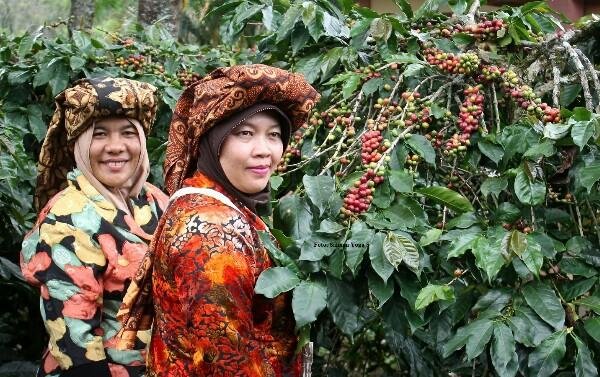Ever sip coffee Gayo? Gayo coffee is milled instead of cut. Gayo coffee taste will be enjoyed when (1) the coffee was ground, then powder brewed with boiling water known as coffee tubruk; or (2) roasted bean or powder formulated with a coffee maker to produce espresso (the essence of coffee) with an optimal taste.
Cut, the taste and smell of Gayo coffee is not found. Why? Coffee sachet must be packed first, then brewed with hot water. Indeed there is a sense of coffee there, but it is certain that his flavor, aroma or body does not represent Gayo coffee at all.
So, what is the description of Gayo's taste of coffee? The results of sensorial analysis showed that Gayo coffee flavor has a strong intensity of aroma and viscosity, not too bitter and not astringent.
In full, the Gayo coffee flavor profile is: (1) free from major flavor defects; (2) a sense of acid from a moderate to high level; (3) bitter taste that is lacking or not at all detected; and (4) the quality and intensity of strong scents.
The acquisition of such tastes is inseparable from the habits of coffee farmers in the Gayo Highlands. They generally already understand the procedure of pick picking, just picking the perfect red cook.
In addition, Gayo coffee comes from an arabica coffee plant planted in the Gayo Highlands, a cool volcanic mountain region; flat, hilly, bumpy, steep and very steep slopes.
It is made up of volcanic mountain sides, such as Mount Geureudong (2,855 MDPL), Mount Tangga (2,500 MDPL), Mount Geumpang (1,002 MDPL), Bukit Singah Mata, Gunung Mueajan (3,079 MDPL), Gunung Leuser (3,140 MDPL) 2.763 MDPL), Mount Pepanyi (2,272 MDPL), Gunung Krueng Pase (1,462 MDPL), Mount Batok (1,500 MDPL), and Mount Burni Telong (2,812 MDPL).
The position of this area is at an altitude between 900 - 1,700 meters from sea level (MDPL). Precisely in the middle of Aceh Province, a tropical region at the latitudes between 96 0BT and 98 0BT and an arc line between 4 0LU and 5 0LU.
Here, the soil types are Andisol, Inseptisol, Ultisol, and Oxisol. However, for the District of Central Aceh and Kabupaten Bener Meriah dominated by Andisol order of land namely Typic Hapudand and Typic Durudand.
Perhaps with the peculiarities of the agroclimate, plus the specific processing methods, it is quite possible that the taste of Gayo coffee produced (in whole) is not the same as the arabica coffee produced in other regions. Plus varieties that have crossed mutations with other varieties that have been previously grown in the Gayo Highlands.
What are the flagship varieties? Based on research results of Indonesian Coffee and Cocoa Research Center (PPKKI) in 2008, the varieties of hope for Gayo Highlands are P-88, Borbor (Gayo2 variety), and Timtim (Gayo1 variety).
For example, P-88 and Borbor planted at altitudes (> 1,400 MDPLs) exhibit very similar flavor profiles. Both of them give the character very good fragrance and aroma, acidity, flavor, body and after taste as well as nice balance. While the varieties of Timtim display flavors that lack of balance because the flavor and acidity slightly weak.
So, what kind of seeds? There are oval seeds (longberry), single seed (peaberry), and there are also smaller seeds (regular). Generally, Gayo coffee beans traded at the international market level are of quality I with a physical defect value of less than 8 per 100 grams. The diameter is greater than or equal to 6.5 mm or 16 with 12% moisture content in accordance with SNI standards and the standards of Specialty Coffee Association of America (SCAA).
How to detect the quality of Gayo coffee? The quality of this coffee can be determined by: (1) Environmental factors, where the coffee is planted, how much the temperature of the air there, and what type of soil. (2) Genetic factors, what type of variety; (3) Processing factors, the level of discipline to maintain quality in processing.
On that basis, the quality of Gayo coffee can be classified in 2 (two) categories. (1) Gayo Specialty Coffee Category is coffee that is handled specifically, such as: certified coffee; coffee from a special area; coffee of a special variety; coffee processing in particular; and coffee special request from buyer. (2) Gayo Regular Coffee Categories are arabica coffee with no special treatment.



You make it sound so good. I want to have some
